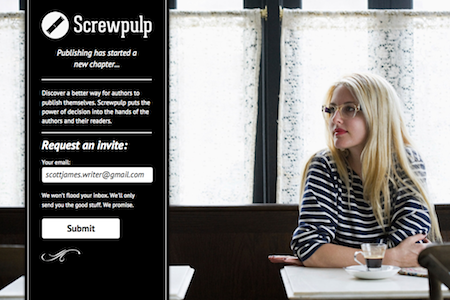Screwpulp's new eBook marketplace model

Just the other day when we were talking about rising eBook sales, Jason M. left a great comment about his own thought process around pricing his eBook:
"I think I'll [start] in the 99-cents cheapo-box and then perhaps steadily raise it, bit by bit as more sales come in and the sites start to work their rankings magic."
Amazingly enough, I discovered a new startup called Screwpulp today that is going to build a store around just that pricing strategy! But that's not all. They are big on empowering authors, which is great, and are also looking to be a place where an author who writes a solid first draft can find potential editors.
Screwpulp's three basic features:
- Free and simple eBook creation
- A marketplace for those eBooks
- A chance for solid first draft eBooks to find an editor
Screwpulp founder Richard Billings did a great interview with the Memphis Flyer, so I'm going to pull some key quotes from him as an explanation for how Screwpulp will work.
1. Free and simple eBook creation
"If you publish with Screwpulp, there are no upfront costs at all, anyone can publish with us... We don't do any editing on the front end."
The more people who offer this kind of service the better, in my opinion. But there are lots of platforms out there that allow you to create an eBook for free already. That's not what makes Screwpulp intriguing.
2. A marketplace for those ebooks
"The first 100 readers can download the book for free. But in exchange, they agree to give the book a review or rate it on a scale of one to five stars and mention the book on social media...
After those 100 people have done the rating, the book goes automatically to costing 99 cents to download. But after the first 1,000 people get it for 99 cents, the book will go up to $1.99 or so per download. We haven't worked out the tiers exactly, but the price will continue to rise as people download it. We'll take 25 percent of that and give the author 75 percent."
This is a fascinating price model. Billings goes on to talk about monitoring when sales drop off so that they can keep the book at a good "sweet spot" where authors sell books and don't price it too high, but also don't underprice their books. I'm also intrigued by the idea of people who get the book for free agreeing to rate and review it. That could be a really powerful way to find beta readers. I did something like that with my Kickstarter campaign, asking those who donated to review the book on Amazon, and out of about 75 requests I got 14 reviews. I'll be interested to see how Screwpulp is going to hold people accountable for those reviews and mentions after they get their free eBook.
3. A chance for solid first draft eBooks to find an editor
"There are a lot of editors out of work. Editors can read a Screwpulp title and say, 'I'm willing to bet on this book.' There could be a bidding war between editors. Those editors who apply would get in a queue, and as an author you could look at the stats of the editors, samples of their work, and Screwpulp could broker a deal between the writer and editor."
Now that's an interesting idea. I've written about Wattpad as a story discovery option for readers to find new stories, but Screwpulp is talking about making a digital slush pile where books could be tested to see if they sell, and then attract a team if they do. It's a little like what PubSlush is doing, where authors are fundraising to see if they have a viable market to sell their book to.
What do you think of Screwpulp's approach? Would you use it?
If you're interested in following Screwpulp and being part of it when they launch, you can sign up for updates on their website and keep up with them on Twitter and Facebook.
Image courtesy of Screwpulp.com screenshot

8 comments